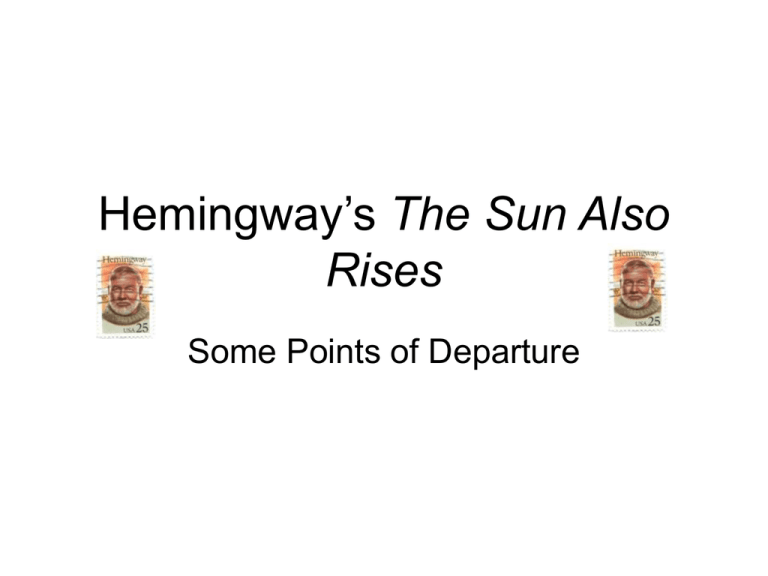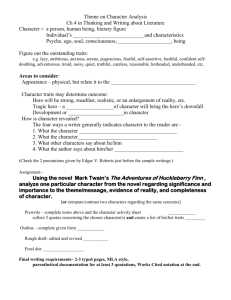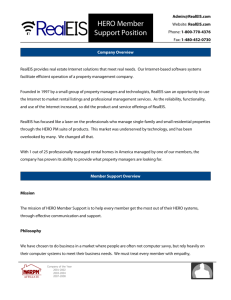Hemingway's The Sun Also Rises-
advertisement

Hemingway’s The Sun Also Rises Some Points of Departure Some Points for Discussion • • • • • Hemingway’s Style Minimalism The Iceberg Theory Use of Dialogue The Code Hero The Iceberg Theory • "If a writer of prose knows enough about what he is writing about he may omit things that he knows and the reader, if the writer is writing truly enough, will have a feeling of those things as strongly as though the writer had stated them. The dignity of movement of an iceberg is due to only one-eighth of it being above water." - Death In the Afternoon, Scribner's, 1932, Chap. 16, 192. • "I always try to write on the principal of the iceberg. There is seven-eights of it under water for every part that shows. Anything you know you can eliminate and it only strengthens your iceberg... It is the part that doesn't show." --Ernest Hemingway,1958 The Code Hero • THE "CODE HERO" • Philip Young coined the term “Code Hero” to help describe the main characters and other characters in Hemingway’s fiction. • The code hero practices a special kind of stoicism in response to the world and his own experiences. • Hemingway defined the Code Hero as "a man who lives correctly, following the ideals of honor, courage and endurance in a world that is sometimes chaotic, often stressful, and always painful." • The "code" dictates that the hero act honorably in the midst of what will be a losing battle. In doing so he finds fulfillment: he becomes a man or proves his manhood and his worth. The phrase "grace under pressure" is often used to describe the conduct of the code hero. The Code Hero 2 A list of the hero’s specific characterisitics might include: 1) A fatalistic acceptance of the difficulties of one’s life. 2) To play along and not make trouble for people. 3) Avoidance of Self-Pity. 4) The use of some form of private ritual by which anxiety is handled. The Code Hero 3 5) Giving in to despair only in private or in the company of another member of the breed. 6) Ability to recognize and establish an immediate understanding with another member of the breed. 7) A constant struggle to see things exactly as they are, no matter how difficult, rather than as one might wish them to be. 8). Viewing others with as little condemnation as possible, and whenever possible, looking at others with “irony and pity” Some Themes for Discussion • • • • • • • The Effects of WWI The Lost Generation The Failure/Death of Love Impotency/Sterility Alienation, isolation Moral Bankruptcy/Hedonism The Failure of Communication Some Intriguing Passages/Ideas • • • • • • • • • • • • • • • “He had been reading W.H. Hudson. That sounds like an innocent occupation, but Cohn had read and reread “The Purple Land.” “The Purple Land” is a very sinister book if read too late in life. It recounts splendid imaginary amorous adventures of a perfect English gentleman in an intensely romantic land . . . . “ “Nobody ever lives their life all the way up except bull-fighters.” “Listen, Robert, going to another country doesn’t make any difference. I’ve tried all that. You can’t get away from yourself by moving from one place to another. There’s nothing to that.” “When I think of the hell I’ve put chaps through. I’m paying for it all now.” “You’re always drinking, my dear. Why don’t you just talk?” “ . . . I only wished I felt religious and maybe I would the next time….” You’re an expatriate. You’ve lost touch with the soil. You get precious. Fake European standards have ruined you. You drink yourself to death. You become obsessed by sex. You spend all your time talking, not working. You are an expatriate, see? You hang around cafes.” What is the function of Count Mippipopolus/ Pedro Romero? What is the function of Fishing? What Is the function of Bullfighting? Why is it important to Robert Cohn to “shake hands”? “It’s no life being a steer.” Jake as Brett’s pimp “Oh, Jake, we could have had such a damned good time together.” “Yes,” I said. “Isn’t it pretty to think so?”




